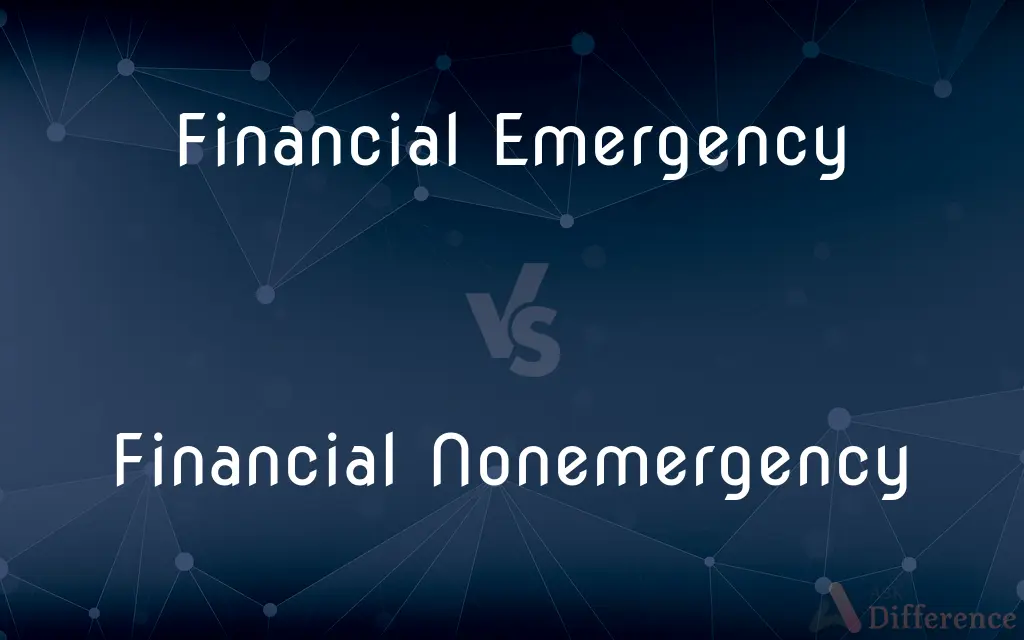Financial Emergency vs. Financial Nonemergency — What's the Difference?
By Tayyaba Rehman & Urooj Arif — Published on February 28, 2024
A financial emergency involves urgent, unforeseen expenses, while a financial nonemergency pertains to expected or nonurgent financial needs.

Difference Between Financial Emergency and Financial Nonemergency
Table of Contents
ADVERTISEMENT
Key Differences
Financial emergencies are sudden and unexpected situations that require immediate financial attention, such as medical emergencies, sudden job loss, or urgent home repairs. These scenarios often necessitate tapping into savings or emergency funds to cover expenses that cannot be postponed. Financial nonemergencies, on the other hand, involve expenses that are foreseeable or can be planned for, such as routine maintenance, planned vacations, or nonessential purchases.
The key difference between the two lies in the urgency and unpredictability of the expenses. Financial emergencies usually come without warning, leaving little to no time for financial planning or saving, and can significantly impact one’s financial stability if not prepared. Financial nonemergencies, however, offer the luxury of time, allowing individuals to save, budget, and plan accordingly without immediate financial strain.
The management of these situations also differs. In a financial emergency, individuals might need to utilize emergency funds, take out loans, or make significant financial adjustments to navigate the crisis. For nonemergencies, individuals can use regular savings, budget adjustments, or planned financing options without dipping into emergency resources.
The impact on financial health can also vary. Financial emergencies can deplete savings, increase debt, and stress financial resources if not managed carefully. Conversely, financial nonemergencies, when planned for, can be accommodated within one’s financial plan without causing significant disruption or stress.
In preparing for these situations, it's crucial to have an emergency fund and a solid financial plan. An emergency fund is essential to cushion the blow of unexpected expenses, whereas a good financial plan helps manage nonemergency expenses in a way that aligns with long-term financial goals.
ADVERTISEMENT
Comparison Chart
Urgency
Immediate and urgent.
Nonurgent and can be planned for.
Predictability
Unpredictable and sudden.
Predictable and expected.
Financial Strategy
Utilize emergency funds or loans.
Use regular savings or budgeting.
Impact
Can significantly strain financial resources.
Can be managed within existing financial plans.
Preparation
Requires an emergency fund.
Involves long-term saving and budgeting.
Compare with Definitions
Financial Emergency
Stressful and unplanned.
The job loss presented a financial emergency, disrupting their stable financial situation.
Financial Nonemergency
No immediate fund requirement.
The desire for a new laptop was a financial nonemergency, allowing time to find the best deal.
Financial Emergency
Urgent financial need.
A sudden medical condition resulted in a financial emergency, requiring immediate funds.
Financial Nonemergency
Managed within budget.
They covered the financial nonemergency of buying new furniture through their savings.
Financial Emergency
Depletes savings.
The financial emergency drained their emergency fund, used for unforeseen house repairs.
Financial Nonemergency
Allows for budget planning.
Upgrading the kitchen was a financial nonemergency, planned over two years.
Financial Emergency
Requires immediate funds.
The unexpected car breakdown turned into a financial emergency due to high repair costs.
Financial Nonemergency
Can be postponed.
The home painting project was a financial nonemergency and was deferred to the next year for budget reasons.
Financial Emergency
Can lead to debt.
Covering the financial emergency expenses led them to take out a high-interest loan.
Financial Nonemergency
Anticipated financial need.
Saving monthly for the planned holiday was a financial nonemergency.
Common Curiosities
What qualifies as a financial emergency?
Sudden, unforeseen events requiring immediate financial attention, like medical emergencies or unexpected job loss.
Should I use my emergency fund for a financial nonemergency?
Ideally, no. The emergency fund should be reserved for true emergencies, not foreseeable or nonurgent expenses.
Can a financial nonemergency become an emergency?
Yes, if a nonemergency expense is neglected and becomes urgent, it can turn into an emergency.
How much should I save for a financial emergency?
It's generally recommended to have an emergency fund that covers 3-6 months of essential living expenses.
What are examples of financial emergencies?
Examples include medical emergencies, urgent home repairs, or unexpected job loss.
Can investing be a financial nonemergency?
Yes, investing is a planned financial activity aimed at building wealth over time, making it a nonemergency.
How should I prepare for a financial emergency?
By building and maintaining an emergency fund that covers 3-6 months of living expenses.
How can I budget for financial nonemergencies?
By setting aside a portion of your income regularly into a savings account designated for planned expenses.
What is a financial nonemergency?
Expenses that are foreseeable and can be planned for, such as routine maintenance or planned purchases.
Is borrowing money a good option for a financial emergency?
It can be a temporary solution, but it's best to rely on an emergency fund to avoid debt.
How can I distinguish between an emergency and a nonemergency expense?
Assess the urgency, necessity, and potential impact of not addressing the expense immediately.
What role does financial planning play in managing nonemergencies?
Financial planning is crucial in anticipating, saving for, and managing nonemergency expenses within one's budget.
Can insurance help with financial emergencies?
Yes, having appropriate insurance can mitigate the financial impact of certain emergencies, like medical or home-related incidents.
Are vacation expenses considered a financial emergency or nonemergency?
Vacation expenses are typically considered a financial nonemergency since they can be planned and saved for in advance.
What's the difference in stress levels between these two?
Financial emergencies typically cause significant stress due to their sudden nature, while nonemergencies, being planned, offer less stress.
Share Your Discovery

Previous Comparison
Nike Air Zoom vs. Adidas Ultra Boost
Next Comparison
Widescreen vs. Full ScreenAuthor Spotlight
Written by
Tayyaba RehmanTayyaba Rehman is a distinguished writer, currently serving as a primary contributor to askdifference.com. As a researcher in semantics and etymology, Tayyaba's passion for the complexity of languages and their distinctions has found a perfect home on the platform. Tayyaba delves into the intricacies of language, distinguishing between commonly confused words and phrases, thereby providing clarity for readers worldwide.
Co-written by
Urooj ArifUrooj is a skilled content writer at Ask Difference, known for her exceptional ability to simplify complex topics into engaging and informative content. With a passion for research and a flair for clear, concise writing, she consistently delivers articles that resonate with our diverse audience.
















































